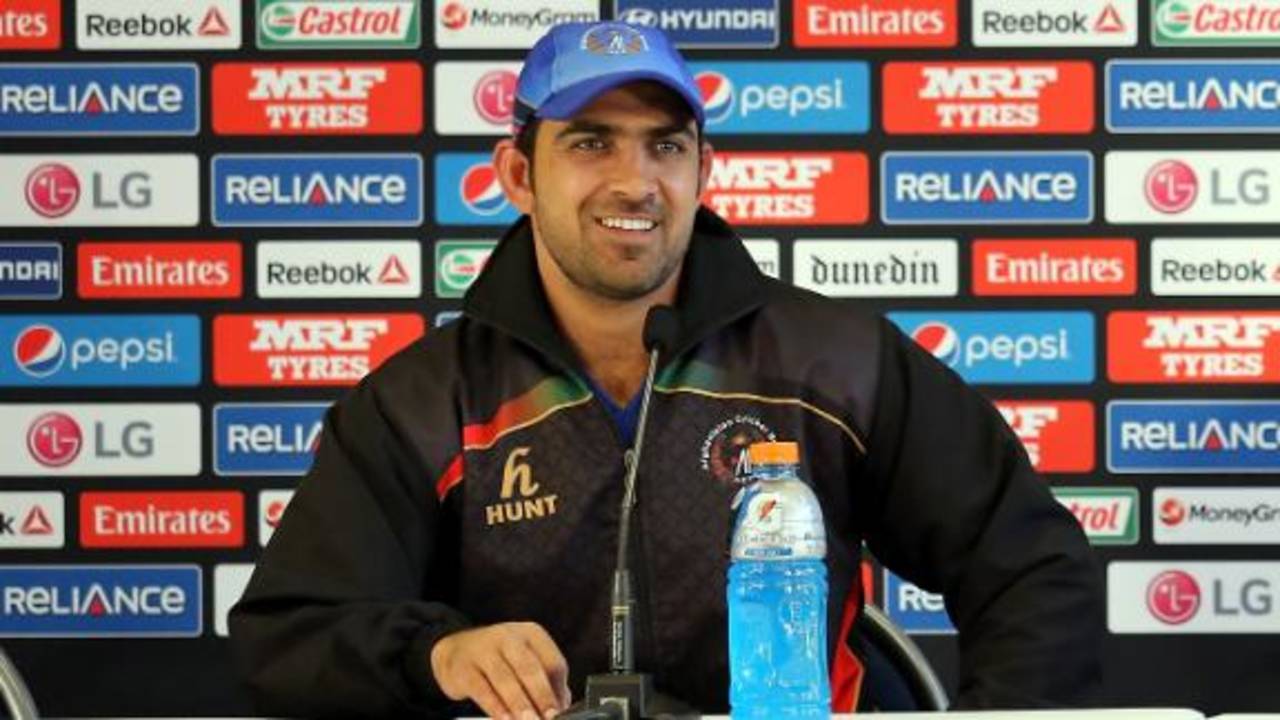Almost a year on from engineering a landmark win against a Test-playing nation,
Samiullah Shenwari was the architect of yet another historical step in the growth of Afghanistan cricket - their first World Cup win. Rewind to March 1, 2014 when Shenwari's 69-ball 81 lifted Afghanistan from 90 for 5 to a match-winning 254 for 6
against Bangladesh in the Asia Cup and you might find an innings not very different to the one that stunned Scotland in Dunedin.
Although the numbers may look different, they do follow the same pattern. Like then, Shenwari had been left with a job at hand. The top order had been bundled out and someone needed to take responsibility. Like then, he had to be careful with his choice of shots in the initial phase of his innings and like then, it was only in the last 10 overs that he ramped up the pace.
"First of all, I would say I did my job, and my job was to stay on the wicket till the end," Shenwari said. "The other players didn't take responsibility, that's why they were out. So I was just telling them [his partners] to just stay at the wicket, and the wicket was not doing anything.
"I can hit it. I can stay on the wicket. They [the management] say if you can stay on the wicket, you can do anything."
Javed Ahmadi was doing his job well till he skipped out of the crease only to get a thick top-edge. He knew he was out way before the catch was taken. At 85 for 3, the rest perhaps thought the target was going to walk to them rather than them making an effort. And so started the collapse by the end of which Shenwari was left with only the last three batsmen to help him out.
Shenwari had an indifferent World Cup before this match, him being taken off the attack
against Bangladesh after only seven deliveries for running on the pitch being the only event of note. Today, he was not bowled at all and he was on 24 off 65 balls by the time he realised he had been left with a mess to clear. It's hard enough to control just your own game, but Shenwari had to walk his partners along too. He tried to farm strike with some success, called for non-existent singles at times before changing his mind and created massive confusion once as he yelled 'No' while continuing for a single.
It's not the ideal way to go about a job but when all else has failed, a team can't really complain. Shenwari continued to move Afghanistan ahead, running hard, biffing a few, and blocking a lot. Dawlat Zadran's slog bewildered him; he hit the ground with his bat in irritation, once, then one more time, then went down on haunches. Next over, he reached his fifty in 113 balls, but he did not let the applause reach him. He had cocooned himself. The job was only getting interesting and there was no time for distraction.
Shorter than Mohammad Nabi, stockier compared to Nowroz Mangal, Shenwari can be an irritating batsmen to bowl at. He is balanced at the crease, he moves forward or back quicker than others in his team, possesses a much neater defensive technique, and has the power game. When he wants to run, he doesn't hit it hard; when he wants to hit a six, he prefers the leg side and he usually clears the ropes easily (one of his five sixes landed on the grand stand roof); serve him a half-volley, he will drive it like car in a drag race. But the most important facet of it all, he knows which one to pull out of the bag, and when.
Majid Haq had dropped Shenwari and as if to rub salt, Shenwari took him on in his last over, hitting the bowler for three sixes before holing out on the fifth delivery. The shot was on but he picked up the only man at cow corner. "I had hit the shot properly, but I don't know why it didn't cross the boundary," he said later with a beaming smile on his face, but at that moment, it was gutting. He trudged off the pitch slowly, came back briefly as umpires checked for the number of fielders outside the ring, then walked back again, distraught that he could not finish the job.
After waiting at the edge of the boundary, he was the first one to let a roar out. "Yeah, when we won, we shouted," he said. "Like one shout, but big shout. Then coach came to calm us down and said it's just one match, and still have a few more matches."
Shenwari missed what would have been his maiden century by four runs. You could tell, though, that it hardly ever mattered. He was the Man of the Match in Dhaka last year and he was the Man of the Match in Dunedin. That big, beaming smile on his face would just not leave him. A sign of a job well done.
Devashish Fuloria is a sub-editor at ESPNcricinfo
